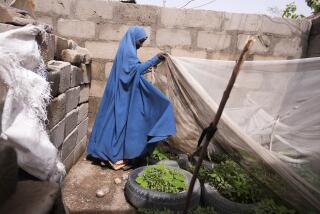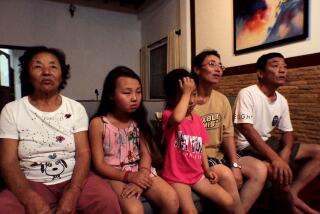‘The First Step Is Understanding That the Suffering Is Real’
- Share via
Say the word “famine” and televised images of Africa come to mind: Walking skeletons scrambling for bags of food, crowding refugee camps, children who are sick or dying. This African lens has distorted our perception of the way most famines look, though, and it is hindering our ability to recognize a more traditional and potentially more deadly crisis underway in North Korea.
In Africa, climate and customs mean the physical condition of starving people is exposed for all to see. And modern-day logistics draw those who are suffering to central places so relief food and medicine can be distributed, amplifying the plight of each individual.
In North Korea, the opposite is true. Its people’s suffering is easy to miss, especially by visitors who don’t get out of the capital. Even those who are determined to understand what’s going on--who note that hillsides are crowded with graves, that orphanages have four times their usual number of children and that many signs and sounds of normal life are missing--can be confounded by bulky, cold-weather clothing and by Koreans’ unrelenting pride. For example, as I entered orphanages, nurses scooped up the sickest babies to hide the extent of their suffering. They couldn’t disguise the head sores that are one mark of malnutrition, though, or the strange silence of children too weak even to cry.
Another example: When I talked with people on the street, through my own interpreter and out of my government minders’ earshot, each insisted that all is well. “I eat three meals a day,” one gaunt woman dressed in rags told me. “There is plenty to eat at home,” a grade-schooler said, hungrily eyeing a package of crackers as he wiggled a toe through a hole in his tattered shoes.
In North Korea, even the doctors didn’t complain, although they conceded that every bed would be full if there were food or medicine or even heat in their hospitals. Instead, they showed only the ways they are coping: how cotton balls used on one patient are cleaned and reused on another; how surgeons work by the light of a window on patients held down by assistants for lack of anesthesia; how herbal medicines have replaced antibiotics in hospital “pharmacies.”
What is happening inside North Korea follows the path traced earlier this century by tens of millions of others living under communism. The parallels to China’s famine, which claimed 30 million people from 1959 to 1962, are eerie. There, wrong-headed agriculture policies driven by political dogma led to death on an unprecedented scale, and yet virtually no outsider understood what was happening. Today, visitors to North Korea who don’t scratch the surface or who expect to see an African-style famine are drawing conclusions similar to those who visited China in the early 1960s but missed its crisis.
Now, though, three years after aid workers first arrived, two important studies are providing clearer information. The first, by Oxfam, concludes that 95% of the country’s water is contaminated. That, combined with a shortage of fuel needed to boil drinking water, explains why disease is rampant--and why food aid alone will not restore millions of people to health.
The second study is the first technically sound examination of North Korean children in more than a decade. Conducted by UNICEF, the U.N.’s World Food Program and others, it found that three-quarters of those under 5 are malnourished, one in six acutely so. Among toddlers aged 1 and 2--whose physical and mental development depends on proper nutrition--nearly one in three is acutely malnourished. These rates put North Korea on a par with the lowest-ranked country in Africa and mean that its children are among the world’s most malnourished.
Unlike the crises in many African nations, North Korea’s problems are not hopelessly linked to a cycle of wars or natural disasters. They are largely man-made, and they can be overcome.
The first step is understanding that the suffering of ordinary people there is real; that withholding humanitarian aid will affect neither North Korea’s government nor its military; and, as we often have seen in Africa, that this famine’s victims won’t forget who helped them in their time of need.
More to Read
Sign up for Essential California
The most important California stories and recommendations in your inbox every morning.
You may occasionally receive promotional content from the Los Angeles Times.










